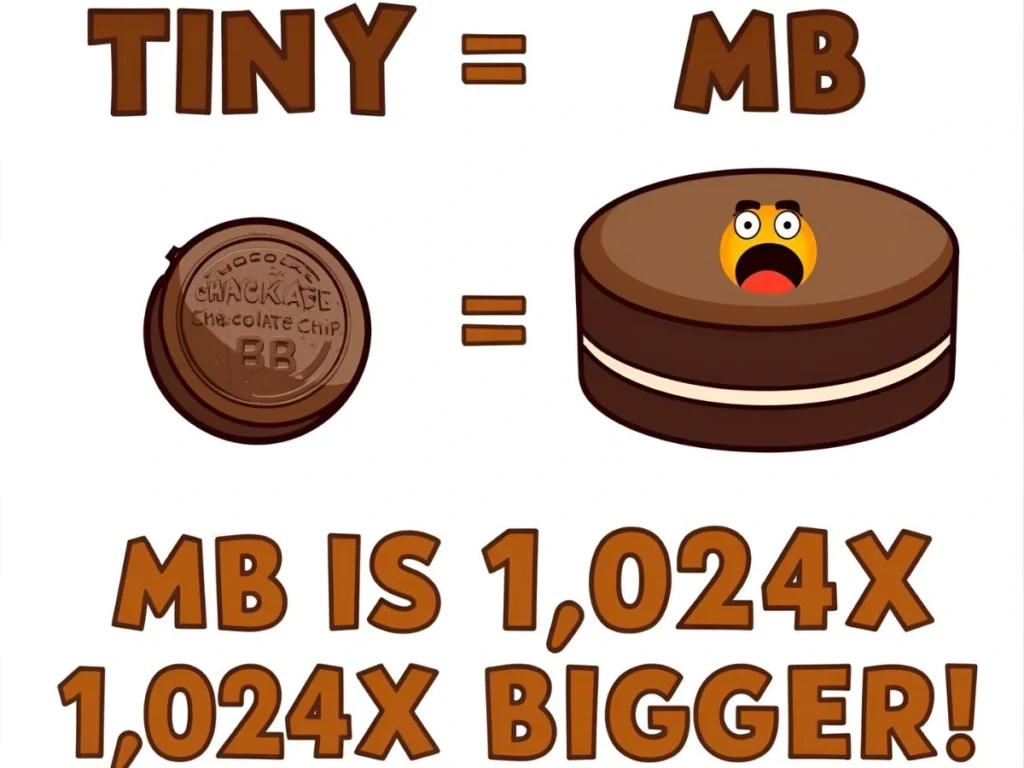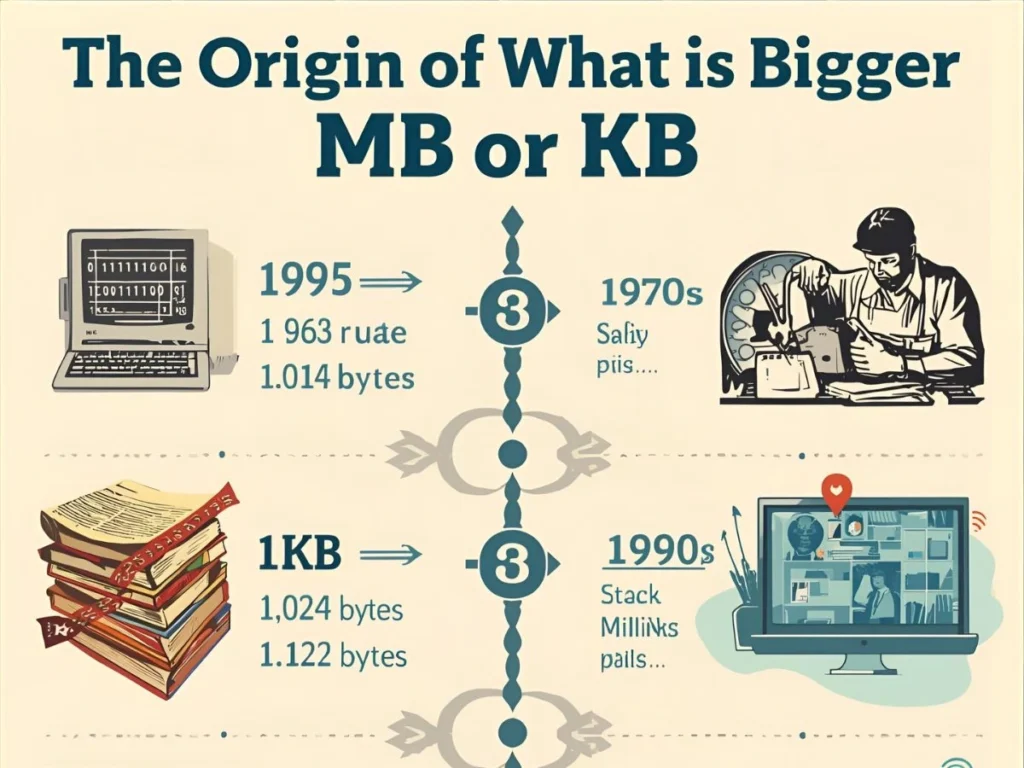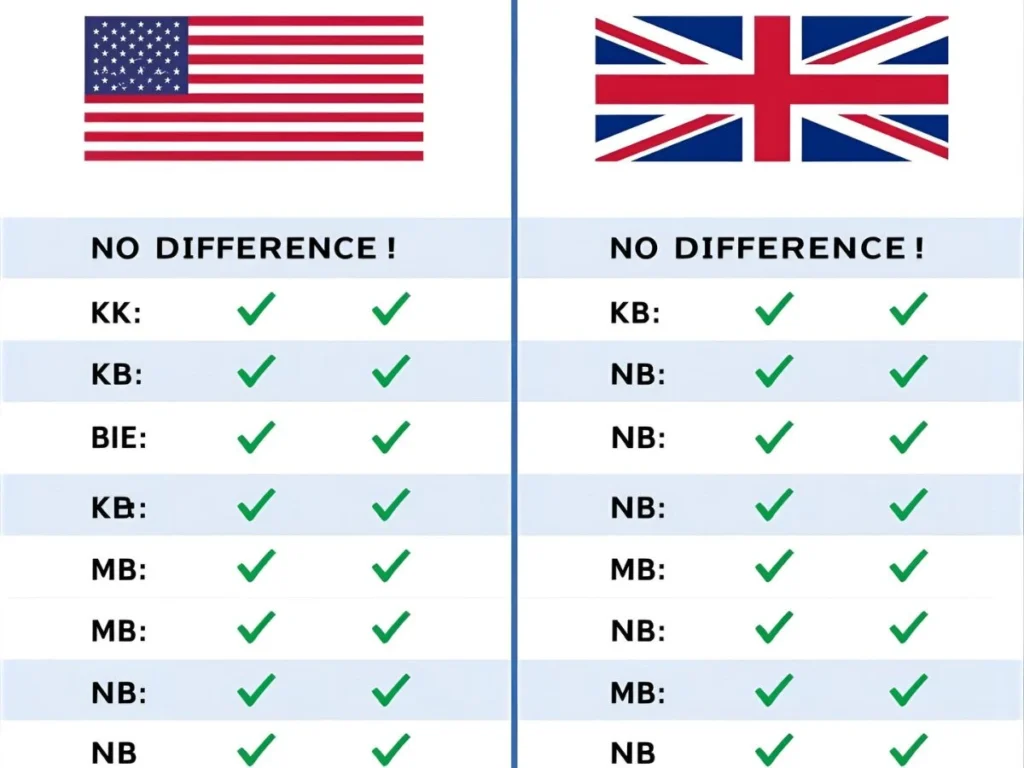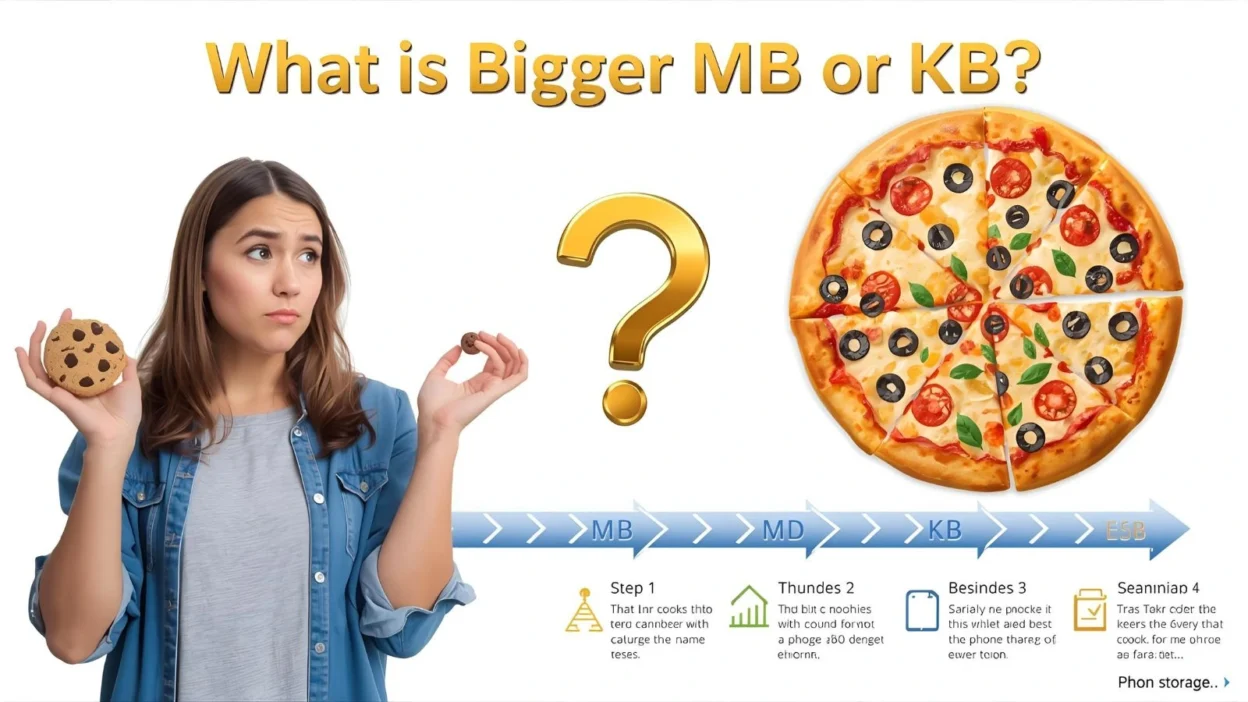Hey! 😩 Ever stared at your phone yelling “Storage Full!” and wondered… wait, why’s that video “MB” but my note’s just “KB”?
You’re NOT alone—millions hit Google every month panicking “what is bigger MB or KB?” (like when your pics won’t upload or downloads crawl!)
Good news: I’m gonna fix this RIGHT NOW in 5 dead-simple steps. No tech talk, no confusion—just instant wins for your phone, emails, photos.
Picture this: No more bounced attachments. No more “out of space” freakouts. You’ll spot the difference in 30 seconds flat.
Ready to laugh at file sizes forever? Let’s crush this together—starting NOW! 🚀
What is Bigger: MB or KB? – Quick Answer

MB is bigger than KB. A megabyte (MB) equals about 1,000 kilobytes (KB). In exact terms, 1 MB = 1,024 KB in computer math.
Think of it like this: A KB is a small snack, like a single cookie (1,024 bytes). An MB is a full meal, like a big pizza (over a million bytes). For example, a short text email might be 10 KB. But a smartphone photo? That’s 5 MB—500 times larger!
This quick fact saves headaches when checking downloads or storage.
The Origin of What is Bigger MB or KB

The question “what is bigger MB or KB” comes from how computers store data. It started in the 1950s with early machines. Engineers needed units for bits—the tiniest data pieces (0 or 1).
A byte groups 8 bits, enough for one letter. “Kilo” means thousand, so KB (kilobyte) = 1,024 bytes (computers love powers of 2, not exact 1,000). “Mega” means million, so MB (megabyte) = 1,024 KB.
No spelling drama here—these are abbreviations, not words with variants. The mix-up grew with the internet boom in the 1990s. People saw file sizes everywhere but forgot the scale. Today, it’s a top search because phones and clouds make us track data daily.
British English vs American English Spelling

MB and KB are the same in British and American English. No spelling fights here! Both use uppercase letters: KB for kilobyte, MB for megabyte.
The real difference? How numbers are said. Brits say “one thousand two hundred” with “and” (one thousand and two hundred). Americans skip the “and.” But for units like MB or KB, it’s identical.
Bits vs. bytes can trip folks—lowercase “b” for bits (mb), uppercase “B” for bytes (MB). This rule holds in both Englishes.
| Aspect | American English | British English |
|---|---|---|
| Unit Spelling | KB, MB (uppercase B) | KB, MB (uppercase B) |
| Number Example | 1,024 KB | 1,024 KB |
| Pronunciation | “One oh two four kay bee” | “One thousand and twenty-four kay bee” |
| Bits Notation | mb (lowercase b) | mb (lowercase b) |
This table shows no big changes—just style tweaks.
Which Spelling Should You Use?
Use KB and MB everywhere. They’re standard global tech terms, not tied to one English type.
For US audiences (like emails to American friends), stick to plain KB/MB. In UK or Commonwealth spots (Canada, Australia), same deal—no tweaks needed.
Go global? Always use uppercase B for bytes. Tools like Windows or Google Drive agree. If writing code, follow IEEE standards: 1 MB = 1,048,576 bytes.
Pick based on your crowd: Tech pros love exact binary (1,024). Casual users? Round to 1,000 for ease. This keeps things clear worldwide.
Common Mistakes with What is Bigger MB or KB
Folks often swap bits and bytes. They see “Mbps” (megabits per second) for internet speed and think it’s MB—oops! Mbps is 8 times smaller than MB/s for downloads.
Another goof: Thinking KB > MB. Nope—it’s backward. Example: A 2 MB song won’t fit in 1 KB space.
Don’t mix cases: “kb” might mean kilobits, not bytes. And forgetting 1,024 vs. 1,000 leads to wrong math. Say you have 500 MB free—it’s not 500,000 KB, but 524,288 KB.
Fix it: Double-check tools like file explorers. Use online converters for quick math.
What is Bigger MB or KB in Everyday Examples
In emails, a plain note is 5-10 KB. Add a photo? Jumps to 2 MB—watch that limit!
News sites load articles in KB but videos in MB. A short clip? 50 MB gone fast.
On social media, a tweet text is tiny (under 1 KB). But an Instagram pic post? 1-3 MB. Stories with filters hit 10 MB quick.
Formal writing, like reports, stays under 100 KB for PDFs. Big ones with charts? 5-20 MB.
Spot it daily: Phone storage says “2 GB left” (about 2,000 MB). Clears the fog on “what is bigger MB or KB.”
What is Bigger MB or KB – Google Trends & Usage Data
Searches for “what is bigger MB or KB” spike worldwide, especially among new phone users. Google Trends shows steady interest since 2004, peaking in back-to-school seasons.
By country, it’s hot in the US (top query in tech help), India (rising with cheap data plans), and Brazil (social media boom). UK and Australia follow close, tied to gadget sales.
Context? Peaks during Black Friday for storage buys. In 2024, interest hit 100/100 in the US for “MB vs KB file size.” Global average: 60/100.
This data proves it’s a timeless puzzle—data grows, but basics stay searched.
| Variation | Meaning | Size Relation | Common Use |
|---|---|---|---|
| KB (Kilobyte) | 1,024 Bytes | Smaller | Text files, small apps |
| MB (Megabyte) | 1,024 KB | Bigger | Photos, songs |
| GB (Gigabyte) | 1,024 MB | Even Bigger | Movies, games |
| mb (megabit) | 1/8 of MB | For speeds | Internet Mbps |
FAQs
What is bigger, MB or KB?
MB is bigger. 1 MB = 1,024 KB.
How many KB in an MB?
Exactly 1,024 KB in 1 MB.
Is GB bigger than MB?
Yes, 1 GB = 1,024 MB.
Why use KB vs MB?
KB for tiny files, MB for medium ones like pics.
Bits vs bytes: What’s the difference?
Bits (b) are speed units; bytes (B) are storage.
How to convert MB to KB?
Multiply MB by 1,024. Tool: 5 MB = 5,120 KB.
Does 1 MB equal 1,000 KB?
Close, but no—it’s 1,024 KB in computers.
Conclusion
We cracked the code on “what is bigger MB or KB”—MB wins, holding 1,024 times more data than KB. From quick facts to daily wins, like sizing emails or photos, this knowledge frees you from guesswork. Remember the roots: bytes build to KB, then mega-scale MB. No English spelling snags here—just clear, universal terms.
Pick MB for bigger files, KB for small stuff. Watch for bit/byte traps, and use converters for ease. As data explodes in our phones and clouds, mastering this builds smart habits. Next time storage warns low, you’ll know: Clear those MB hogs first. Embrace it—your tech life gets smoother, faster, and less frustrating. Share this with a puzzled friend; spread the clarity!

I am Clara Hayes a unique and modern name with a classy, trending appeal.
I am known for elegance, simplicity, and global style.
On Grammexa.com, I stand out as a perfect contemporary name choice.



